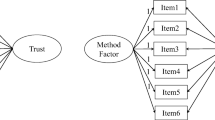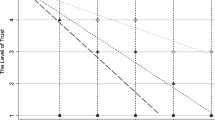Abstract
Generalized trust features as the most prominent attitudinal element of social capital, and as such the concept is widely used in comparative research. In this article we investigate the cross-cultural equivalence of the three-item scale on generalized trust that is included in the European Social Survey 2002 and 2004 waves. The use of metric equivalence tests demonstrates that these tree items can be considered as a reliable and cross-culturally valid concept. If we apply the stricter scalar equivalence test, however, the result is that the scale is not sufficiently equivalent across European societies, with especially the item on expecting help from others showing major problems in a number of countries. We close this article by offering some suggestions on how the generalized trust scale might be used in a (sufficiently) reliable manner in cross-cultural research across Europe.


Similar content being viewed by others
Notes
The countries in the first wave are Austria, Belgium, Switzerland, Czech Republic, Germany, Denmark, Spain, Finland, France, United Kingdom, Greece, Hungary, Ireland, Italy, Israel, Luxembourg, Netherlands, Norway, Poland, Portugal, Sweden and Slovenia. We did not include Israel in this analysis, because that country has a number of very distinct social characteristics, compared to all other European ESS-countries.
Italy and Israel are not included in the second wave while Estonia, Iceland, Slovakia and Ukraine are the four new countries in the second wave of the ESS.
References
Arneil, B. (2006). Diverse communities: The problem with social capital. Cambridge: Cambridge University Press.
Billiet, J. (2003). Cross-cultural equivalence with structural equation modeling. In J. A. Harkness, F. J. R. Van de Vijver, & P. Ph. Mohler (Eds.), Cross-cultural survey methods (pp. 247–263). Hoboken: Wiley.
Bollen, K. A. (1989). Structural equations with latent variables. New York: Wiley.
Bollen, K., & Long, K. A. (1992). Tests for structural equation models. Sociological Methods and Research, 21, 123–131.
Byrne, B. M., Shavelson, R. J., & Muthén, B. (1989). Testing for the equivalence of factor covariance and mean structures: The issue of partial measurement invariance. Psychological Bulletin, 105(3), 456–466.
Cheung, G. W., & Rensvold, R. B. (2000). Assessing extreme and acquiescence response sets in cross-cultural research using structural equation modeling. Journal of Cross-Cultural Psychology, 31(2), 187–212.
Cheung, M. W.-L., Leung, K., & Au, K. (2006). Evaluating multilevel models in cross-cultural research. Journal of Cross-Cultural Psychology, 37(5), 522–541.
Churchill, Jr. G. A. (1979). A paradigm for developing better measures of marketing constructs. Journal of Marketing Research, 16(1), 64–73.
Coleman, J. (1990). Foundations of social theory. Cambridge: Belknap Press.
CSM (2004). GSS cumulative datafile 1972–2004. Berkeley: Computer-Assisted Survey Methods Program. [Survey Documentation and Analysis: http://sda.berkeley.edu/cgi-bin/hsda?harcsda+gss04].
Delhey, J., & Newton, K. (2005). Predicting cross-national levels of social trust: Global pattern or nordic exceptionalism? European Sociological Review, 21(4), 311–327.
Gambetta D., (Ed.) (1988). Trust. making and breaking cooperative relations. New York: Blackwell.
Gerbing, D. W., & Anderson, J. C. (1988). An updated paradigm for scale development incorporating unidimensionality and its assessment. Journal of Marketing Research, 25(2), 186–192.
Glaeser, E., David L., Jose S., & Christine S. (2000). Measuring turst. Quarterly Journal of Economics, 115(3), 811–846.
Hardin, R. (2002). Trust and trustworthiness. New York: Russell Sage Foundation.
Harkness, J. A., Van de Vijver, F. J. R., & Mohler, P. Ph. (2003). Cross-cultural survey methods. Hoboken: Wiley.
Hooghe, M., Reeskens, T., & Stolle, D. (2007). Diversity, multiculturalism and social cohesion: Trust and ethnocentrism in European societies. In K. Banting, T. J. Courchene, & F. L. Seidle (Eds.), Belonging? Diversity, recognition and shared citizenship in Canada (pp. 387–410). Montreal: Institute for Research on Public Policy.
Hooghe M., & Stolle D. (Eds.). (2003). Generating social capital. Civil society and institutions in comparative perspective. New York: Routledge.
Johnson, T. P. (1998). Approaches to equivalence in cross-cultural and cross-national survey research. ZUMA-Nachrichten Spezial, 3, 1–40.
Kaariainen, J., & Lehtonen, H. (2006). The variety of social capital in welfare state regimes. A comparative study of 21 countries. European Societies, 8(1), 27–57.
King, G., Murray, C. J. L., Salomon, J. A., & Tandon, A. (2004). Enhancing the validity and cross-cultural comparability of measurement in survey research. American Political Science Review, 98(1), 191–207.
Meredith, W. (1995). Two wrongs may not make a right. Multivariate Behavioral Research, 30(1), 89–94.
Meuleman, B., & Billiet, J. (2006). Quality and comparability of measures in the ESS: Attitudes towards migration and immigrants. Paper presented at the SMABS Conference, Budapest, 2–5 July 2006.
Miller, A., & T. Mitamura (2003). Are surveys on trust trustworthy? Social Psychological Quarterly, 66(1), 62–70.
Mullen, M. R. (1995). Diagnosis measurement equivalence in cross-national research. Journal of International Business Studies, 26(3), 573–596.
Muthén, L. K., & Muthén, B. O. (1998–2006). Mplus user’s guide: (4th ed.) Los Angeles: Muthén & Muthén.
Newton, K. (1999). Social and political trust in established democracies. In P. Norris (ed.), Crtical citizens (pp. 169–187). Oxford: Oxford University Press.
NSD (2006). European social survey data. Bergen: Norwegian Social Science Data Services. [NSD: http://ess.nsd.uib.no].
Portes, A. (1998). Social capital: Its origins and applications in modern sociology. Annual Review of Sociology, 24, 1–24.
Putnam, R. (1993). Making democracy work: Civic traditions in modern Italy. Princeton: Princeton University Press.
Putnam, R. (2000). Bowling alone: The collapse and revival of American community. New York: Simon & Schuster.
Raju, N. S., Laffitte, L. J., & Byrne, B. M. (2002). Measurement equivalence: A comparison of methods based on confirmatory factor analysis and item response theory. Journal of Applied Psychology, 87(3), 517–529.
Rensvold, R. B., & Cheung, G. W. (1998). Testing measurement models for factorial invariance: A systematic approach. Educational and Psychological Measurement, 58(6), 1017–1034.
Rosenberg, M. (1956). Misanthropy and political ideology. American Sociological Review, 21(6), 695.
Rotenberg, K. et al. (2005). Construction and validation of children’s interpersonal trust belief scale. British Journal of Developmental Psychology, 23(2), 271–292.
Rothstein, B., & Uslaner, E. (2005). All for one. equality, corruption, and social trust. World Politics, 58(1), 41–72.
Spector, P. E. (1992). Summated rating scale construction: An introduction. Newbury Park: Sage.
Smith, T. W. (1988). The ups and downs of cross-national survey research. GSS Cross-National Report No. 8. Chicago: National Opinion Research Center, University of Chicago.
Steenkamp, J., & Baumgartner, H. (1998). Assessing measurement invariance in cross-national consumer research. Journal of Consumer Research, 25(1), 78–90.
Stolle, D. (1998). Bowling together, bowling alone. The development of generalized trust in voluntary associations. Political Psychology, 19(3), 497–526.
Stolle, D. (1999). Onderzoek naar Sociaal Kapitaal: Naar een Attitudinale Benadering. Tijdschrift voor Sociologie, 20(3–4), 248–280.
Stolle, D., & M. Hooghe (2005). Inaccurate, exceptional, one-sided or irrelevant? The debate about the alleged decline of social capital and civic engagement in western societies. British Journal of Political Science, 35(1), 149–168.
Stoop, I., Jowell, R., & Mohler, P. (2002). The European Social Survey: One survey in two dozen countries. Paper presented at the international conference on improving surveys, Copenhagen, 25–28 August 2002.
UNDP (2006). Human development report 2006. Oxford: Oxford University Press.
Uslaner, E. (2002). Moral foundations of trust. New York: Cambridge University Press.
Van de Vijver, F. J. R. (2003). Bias and substantive analyses. In J. A. Harkness, F. J. R. Van de Vijver, & P. Ph. Mohler (Eds.), Cross-cultural survey methods (pp. 247–263). Hoboken: Wiley.
Yamagishi, T., & M. Yamagishi (1994). Trust and commitment in the United States and Japan. Motivation and Emotion, 18(2), 129–166.
Author information
Authors and Affiliations
Corresponding author
Rights and permissions
About this article
Cite this article
Reeskens, T., Hooghe, M. Cross-cultural measurement equivalence of generalized trust. Evidence from the European Social Survey (2002 and 2004). Soc Indic Res 85, 515–532 (2008). https://doi.org/10.1007/s11205-007-9100-z
Received:
Accepted:
Published:
Issue Date:
DOI: https://doi.org/10.1007/s11205-007-9100-z




